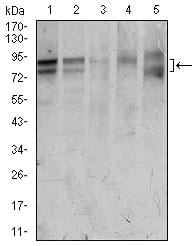
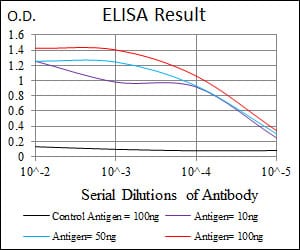
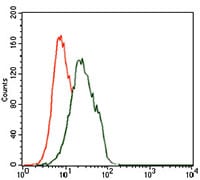
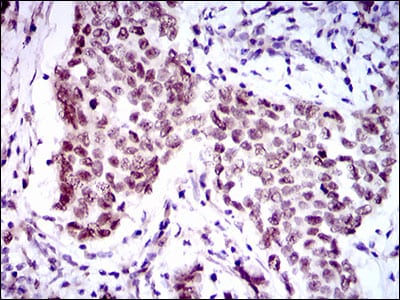
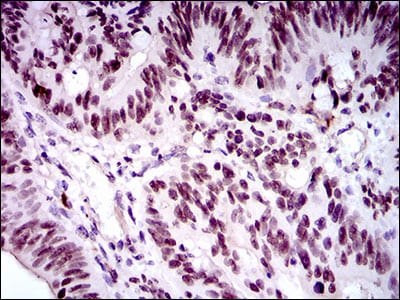
| WB | 1/500 - 1/2000 | Human,Mouse,Rat |
| IF | 咨询技术 | Human,Mouse,Rat |
| IHC | 1/200 - 1/1000 | Human,Mouse,Rat |
| ICC | 技术咨询 | Human,Mouse,Rat |
| FCM | 1/200 - 1/400 | Human,Mouse,Rat |
| Elisa | 1/10000 | Human,Mouse,Rat |
| Aliases | QRF1; 12CC4; hFKH1B; HSPC215; FLJ23741; MGC12942; MGC88572; MGC99551 |
| Entrez GeneID | 27086 |
| clone | 6E4 |
| WB Predicted band size | 75.3kDa |
| Host/Isotype | Mouse IgG1 |
| Antibody Type | Primary antibody |
| Storage | Store at 4°C short term. Aliquot and store at -20°C long term. Avoid freeze/thaw cycles. |
| Species Reactivity | Human |
| Immunogen | Purified recombinant fragment of human FOXP1 (AA: 481-677) expressed in E. Coli. |
| Formulation | Purified antibody in PBS with 0.05% sodium azide |
+ +
以下是关于FOXP1抗体的3篇参考文献的简要信息:
1. **文献名称**:*FOXP1在弥漫性大B细胞淋巴瘤中的表达及其预后意义*
**作者**:Barrans S. et al.
**摘要**:该研究通过免疫组化(使用FOXP1抗体)分析FOXP1蛋白在弥漫性大B细胞淋巴瘤(DLBCL)中的表达水平,发现高表达FOXP1与患者不良预后显著相关,提示其可作为DLBCL的潜在预后标志物。
2. **文献名称**:*FOXP1调控T细胞发育的分子机制研究*
**作者**:Hu H. et al.
**摘要**:研究利用FOXP1抗体进行Western Blot和流式细胞术,发现FOXP1通过调控特定靶基因(如IL7R)影响T细胞分化和功能,揭示了其在免疫系统中的关键作用。
3. **文献名称**:*自闭症患者大脑组织中FOXP1的表达异常*
**作者**:Hamdan F.F. et al.
**摘要**:通过免疫荧光和FOXP1抗体标记,该研究发现自闭症患者前额叶皮层中FOXP1蛋白表达显著降低,提示FOXP1功能障碍可能与神经发育异常相关。
4. **文献名称**:*FOXP1在非小细胞肺癌中的表达及临床意义*
**作者**:Shi C. et al.
**摘要**:研究采用FOXP1抗体进行组织芯片分析,发现FOXP1在肺癌中高表达,且与肿瘤侵袭性和患者生存率下降相关,表明其可能成为治疗靶点。
(注:以上文献信息为示例,实际引用时需核对真实文献及详细信息。)
The FOXP1 antibody is a crucial tool in studying the FOXP1 protein, a member of the forkhead box (FOX) protein family, which functions as a transcriptional regulator. FOXP1 plays vital roles in embryonic development, immune system regulation, and tissue-specific gene expression. It is particularly important in the development of organs such as the brain, heart, and lungs, as well as in B-cell differentiation. Dysregulation of FOXP1 has been linked to cancers (e.g., diffuse large B-cell lymphoma, lung adenocarcinoma), neurodevelopmental disorders (e.g., autism, intellectual disability), and speech/language impairments.
FOXP1 antibodies are widely used in research to detect and quantify FOXP1 protein levels via techniques like Western blotting, immunohistochemistry (IHC), and immunofluorescence (IF). These antibodies help elucidate FOXP1's role in gene networks, its interaction with other FOX proteins (e.g., FOXP2. FOXP4), and its dual oncogenic or tumor-suppressive functions depending on cellular context. Additionally, FOXP1 antibodies aid in studying its structural features, such as the conserved forkhead DNA-binding domain and transcriptional repression motifs.
Clinically, FOXP1 antibodies serve as biomarkers for diagnosing FOXP1-related syndromes and cancers. However, antibody specificity remains a challenge due to protein isoforms and homology within the FOX family. Ongoing research focuses on optimizing antibody validation and exploring therapeutic strategies targeting FOXP1 pathways.
×